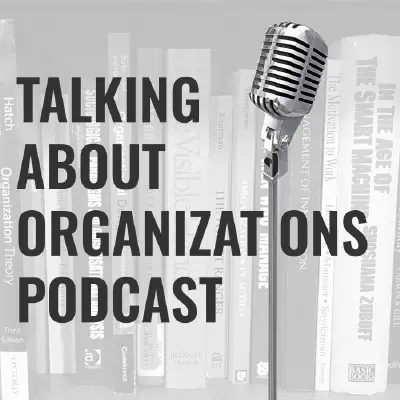
Talking About Organizations Podcast
324 episodes Last Updated: Jun 03, 25
Talking About Organizations is a conversational podcast where we talk about one book, journal article or idea per episode and try to understand it, its purpose and its impact. By joining us as we collectively tackle classic readings on organization theory, management science, organizational behavior, industrial psychology, organizational learning, culture, climate, leadership, public administration, and so many more! Subscribe to our feed and begin Talking About Organizations as we take on great management thinkers of past and present!
Episodes
Coming soon! We will examine Harry Braverman’s 1974 book Labor and Monopoly Capital: The Degradation of Work in the 20th Century. It is considered a foundational text on labor relations and the systematic ways that work has been deskilled over time and why. How well have his arguments stood the test of time to the present day?
In Part 2 of our episode on Barley, we conclude the discussion on the relationship that he drew among the institutionalized patterns of behavior in the hospitals, the actions that the radiologists and technologists undertook, and the subsequent changes to those patterns. How can we use these ideas to better understand work and technological change today? Are there other newer lenses with which we can make sense of on-going structuration?
This month we discuss a foundational work by Steven Barley on the introduction of new technologies into established organizations. His study of the fielding of CT scanners in two hospitals showed how established organization structures and patterns of behavior influenced actions undertaken by radiologists and the new CT technologists, which in turn changed the structures in the hospital. This study contributed to a greater understanding of the relationships between institutions and action.
Steven Barley’s career has produced considerable scholarship on meaningful work and change in organizations. This month’s episode will cover one of his earliest works on the introduction of CT scanners in two hospitals that greatly altered the structures of their respective radiology departments. Of interest was the story of how that restructuring took place. Stay tuned!
In Part 2 of our episode on Prasad, we shift our attention to his 2003 book chapter titled “The gaze of the other: Postcolonial theory and organizational analysis” that synthesizes the foundational works of postcolonial theory and tie it to cross-cultural challenges faced by contemporary organizations. We also discuss the implications of the theory in the two decades that followed given the significant global changes that have occurred. How well does the theory hold up given that some of its premises might have shifted?
Anshuman Prasad (1954-2023) was a leading scholar and development of postcolonial theory and bringing it to the domain of management and organization studies. The theory strove to explain the significance influences and impacts that Western colonialism had on non-Western cultures and its implications for organizations located in non-Western settings. We are reading two of his many works, one about the specific use of science as a tool of colonialism and the other is a book chapter that summarizes the works of the early postcolonial theorists.
Coming soon! We will cover the works of Anshuman Prasad and his development of postcolonial theory and its use in organizational analysis. By examining the origins and spread of Western thought through the colonial period, he explains how much of the Western philosophies and epistemologies remain dominant and the cross-cultural challenges that this presents.
This is Part 2 on our discussion of Fligstein’s 1996 article, “Markets as politics: A political-cultural approach to market institutions." Here we work our way through the 16 propositions” (or provocations as we would refer to them)and test them out from a contemporary view. Do they make sense in retrospect? Do they continue to lend themselves toward a useful research agenda? What alternative or additional propositions might we come up with?
Fligstein’s 1996 article, “Markets as politics: A political-cultural approach to market institutions,” was an important contribution to the field of economic sociology, countering the dominant neoclassical view of economics that failed to explain market behaviors in practice. He argued for an alternative paradigm – a “political-cultural” model that suggested that the formation of markets was part of “state building” and subjected to various social institutions that belonged to the state such as property rights and rules of exchange. A very provocative piece that bridges institution theory with theories of social action.
We will cover the economic sociology of Neil Fligstein, who countered the dominant 1990s-era neoclassical view of economics that failed to explain well various market behaviors being observed at the time. He argued for an alternative paradigm – a “political-cultural” model that suggested that the formation of markets was part of “state building” and subjected to various social institutions that belonged to the state.